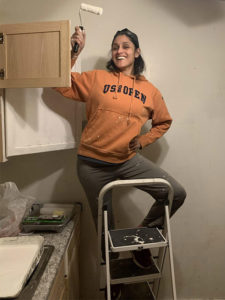Net Gain: From Babson to Financial Freedom

When she was a professional tennis player in her teens and early 20s, Sunitha Rao ’14 often encountered people in the sport who did not have her best interest at heart.
“Coming up as a female athlete—it is a brutal place. There were many adults taking advantage of young women in every way possible,” Rao says. “I was told again and again by men that I would never be anything without them and never be anything outside of the sport. That was the narrative that was shoved down my throat.”
At the age of 23, worn out and nearly broke, Rao walked away from tennis, a sport that had defined her and once took her to the Olympic Games. She now needed to find a new purpose for her life, and in the process, push back against all the manipulative people she had met and all their negative predictions for her. “I wasn’t going to accept that,” she says. “I have always been a rebel.”
In this two-part series, we look at the life and career of Sunitha Rao, who was pushed into tennis at a young age and then found herself having to start over in her early 20s, a daunting prospect given that she had dropped out of school after the sixth grade and was unsure of what direction her life should take.
Despite all the uncertainty, though, she did know one thing for sure: She wanted a life that offered her independence and empowerment. In this second and final installment of the series, we look at how she achieved just that.
A Chance Meeting
After leaving behind her tennis career, Rao came to live in Florida, where she pieced together a new life. In the mornings, she taught tennis at a resort, and, at nights, she worked as a bartender. She also was attending community college, though she was hoping to transfer to another school.
One night at the bar, a group came in, and Rao got to talking to them. One man was a graduate of Babson College, a school that Rao happened to be researching and considering, and he offered to connect her with the College’s dean of undergraduate admissions.

Just like that, a chance meeting in a bar changed the direction of Rao’s life. Soon, she was meeting with that Babson dean and being accepted for admittance. Most crucially, she received a financial aid package that covered her full tuition, a turn of events that left her stunned. “I called a best friend bawling my eyes out,” Rao says. “He couldn’t understand a word I said and thought I had gotten into a car accident.”
Coming to Babson as an undergraduate was an adjustment for Rao. At 25, she was older than her classmates, but they still seemed so much more well-informed and sure of their place in the world. “I was trying not to flunk out,” she says. “This was my chance for redemption. I had to work really hard to level the playing field because of what I missed.” She credits her professors for their help, in particular Marjorie Feld, a professor of history. “She became my aunt,” Rao says.
At Babson, Rao learned to carry herself with confidence, even if she didn’t feel that way. “In order to be successful, you have to act successful,” she says. “I didn’t see myself as a success.” Ultimately, though, she thrived at Babson. “I am so grateful for it,” she says. “I learned so much from that time. A lot of what I learned set me up for life.”
After graduating, Rao landed a job at a defense contractor, a stable income that she was happy to have, at least at first.
Something Needs to Change
At the defense contractor, Rao participated in a development program that involved leadership training and rotations through various financial positions. In the early going, she found the work rewarding. She won awards, she was training people in higher positions than her, and she was making an impact.
But the shine of the new job wore off. Rao learned that she was the lowest paid in her cohort, and she realized that her hard work wasn’t being appreciated. The company didn’t seem to notice her accomplishments or even her skills. “We know you are good at things,” one manager told her, “but we don’t know what they are.”
“It doesn’t matter what business you start. Believing in the process is hard. You are betting on yourself again and again. That can be hard day in and day out. It is a series of obstacles. You have to figure it out as you go along.”
Sunitha Rao ’14
At that point, she began to think back on her time in tennis, how she was always struggling to get by, and about her mother being trapped in an abusive relationship because she didn’t have the financial means to leave. Not that her current situation was as dire as the one her mother was once in, but Rao recognized all too well, by being stuck in a job that didn’t appreciate her, that the control of her future path now felt out of her hands. “I was trapped in a place where my options were limited,” she says. “That was the moment where I thought, something needs to change.”
Rao left the defense contractor, and other jobs have followed, in biopharma and in the mortgage and lending industry. Today, she is a project manager at Afford Anything, a finance and investing platform. She also went on to earn her MBA at Villanova University.
To make sure she is never too dependent on one income source, however, Rao also has taken a leap into a new field: real estate investing.
Financial Freedom
Intrigued by the scalability of real estate investing and how each property one considers buying has its own history, Rao began purchasing homes. She owns six in all. Typically, she buys distressed homes and fixes them up, and then rents them out on a short- and long-term basis.

While Rao started buying properties when she was living in the Boston area, she actually didn’t invest in that market. It was too expensive, especially for a novice investor, so she considered what other regions might be best for investing based on a variety of economic factors. She eventually settled on Indianapolis and has since moved to the city. “I could build a business from a distance,” she says, “but I want boots on the ground.”
Becoming an investor required a lot of research and education. It also required having faith that she could pull it off. “It doesn’t matter what business you start. Believing in the process is hard,” she says. “You are betting on yourself again and again. That can be hard day in and day out. It is a series of obstacles. You have to figure it out as you go along.”
The effort is worth it. Rao is now living life on her terms. She has the fiscal independence she has long sought. Unlike when she was growing up, or playing on the tennis court, or entering her first job in corporate America, she now controls her financial destiny. “It took me a long time to learn what I know,” she says. “If you don’t have the ability to manage your money, life can get difficult real fast.”
Rao calls her investment firm the Griffix Property Group. At the top of its home page is written, “Financial freedom is freedom.”
Part 1: Why Sunitha Rao ’14 walked away from her pro tennis career.
Posted in Entrepreneurial Leadership




